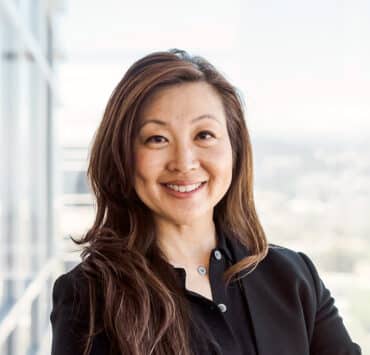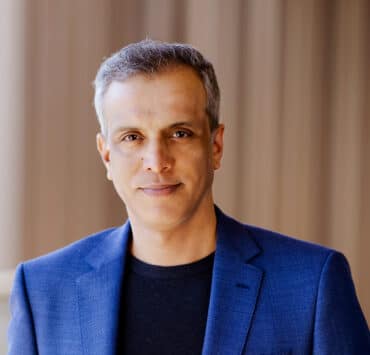|
Getting your Trinity Audio player ready...
|
There are kids who play with dolls and action figures. And then there are future MENSA candidates who ask their parents for a telescope on Christmas.
LeKeisha Suggs gravitated more toward the latter. Not that she ever cared about applying to join a high-IQ society, but she was smart enough to question the world around her like a scientist. Every day was her own episode of “How It’s Made?” where she formed a hypothesis and experimented to find the answers. The more she tested the boundaries of her knowledge, the more amazed she was by each discovery.
“Every time that I would look at something, I would always sit there and say to myself, ‘well, how does this work? How can I break this down from a problem perspective to actually working on solutions?” she remembers.
Suggs continues, “Sitting on the plane, I’m looking out the window and everyone else is thinking about their destination or what they’re going to do once there. I’m sitting there tapping my parents. I’m asking them, ‘What are those flaps that are opening on the wing?’ or ‘What’s that noise?’ I’m hearing the wheels retracting and thinking, ‘How is it possible?’”
Fast-forward to Suggs’s college years, and her astronomically high levels of curiosity started to pay off. Not only did she study aerospace engineering at the University of Michigan, but she also landed an internship with NASA. She went from wishing for a telescope under her family’s Christmas tree to working on a real-life telescope in the James Webb Space Telescope program. Then, just as she found the perfect launching pad for her post-graduate career to take off, she unearthed a new world of opportunity when she met with patent attorneys at NASA and learned about their careers.
“It just seemed like such a great integration of two sides of my personality, where I still can be involved in the science aspect of being around the latest innovations and technology, but kind of come at it from a different direction,” Suggs says.
“Let your curiosity drive you and be willing to forge your own path that is uniquely you.”
LeKeisha Suggs
For the first time ever, she got a grasp of how dynamic science careers are. She learned you can leave a lasting impact on STEM organizations without wearing a white lab coat. Behind the scenes, there were experts in intellectual property law who shared the same affinity for science and innovation that she had.
Once she graduated from the University of Michigan, she shifted her focus toward becoming a patent attorney and enrolled in Western Michigan University’s Cooley Law School.
During a summer clerkship at Brooks Kushman PC, Suggs held most of the same responsibilities as an IP lawyer. From counseling clients and drafting patent applications to getting wrapped up in pro bono cases, she fully immersed herself in her work and left no stone unturned. Her impact was so immediate that the IP law firm hired her on a full-time basis for her final year of law school.
After she earned her JD and passed the Michigan bar exam, Suggs was promoted to patent attorney. But five years as an associate flew by, and she questioned whether pursuing the partnership route was worth it. “I really wanted to have a broader perspective and have a seat at the table where I could engage in those IP strategy dialogues and be a part of the business decision-making process,” she reflects.
Suggs yearned to arrive at the intersection of science and law like those patent attorneys at NASA did. So when Schaeffler Group offered her the chance to be a patent attorney in its IP department for the Americas, she didn’t need to think twice before joining the global automotive and industrial supplier.
“I really wanted to have a broader perspective and have a seat at the table where I could engage in those IP strategy dialogues and be a part of the business decision-making process.”
LeKeisha Suggs
“It finally felt like I was forging that path for myself and finding balance between my curiosity as an academic and my passion for science,” she explains. “My own work to understand the bigger picture, and not just the discrete parts that make up the whole.”
While the attorney scored a personal victory upon returning to an established STEM organization, she hit the ground running with a start-up mentality. As she entered a team with just five patent attorneys, she managed a technology portfolio while balancing oversight of its outside counsel. Because Schaeffler files its own patent applications for over 50 percent of their matters, Suggs realized the global manufacturing group would need another legal mind to develop processes and structure to support its teams in over fifty countries.
The only problem? Schaeffler wasn’t hiring one to make this happen.
Suggs checked Schaeffler’s internal job board. Still, there was no luck.
Instead of playing the waiting game until Schaeffler searched for another patent attorney, she decided to play chess (not checkers). She bet on herself and proposed a new role that would allow her to spearhead new processes and procedures for all aspects of IP operations at Schaeffler. And before she knew it, she was named senior patent attorney and manager of IP operations.
Ever since carving out her own role in 2019, Suggs has doubled down on a collaborative leadership approach and forged stronger relationships with global teams at Schaeffler. Thanks in part to initiatives she coined, including a six-hundred-page IP operations manual and team training sessions, employees who once hesitated to work together became more aligned than ever. Schaeffler’s IP processes in the Americas are flowing more seamlessly with the rest of its global counterparts than it did three years ago.
“I think it really has helped strengthen us from where we were at a few years ago to where we stand now as a very strong independent IP department that still has close alignment with our global partners,” Suggs says. “I use the word ‘partners’ because that’s not something that comes overnight, or something that’s just by default. It’s something that comes from years of taking the proactive steps to develop those relationships.”
Venable, LLP:
“Working alongside LeKeisha has been a continuously rewarding experience. Her collaborative approach and insights into complex issues make it a pleasure to work on Schaeffler Group projects. I’m proud to count her among my clients.”
–Justin Oliver, Partner


